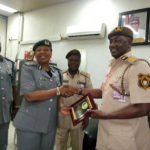
An airport has two sides. There is the land side, which hosts the terminal and all the things needed to make it possible for passengers to access the airplane for a flight. These include structures for passenger facilitation, security system and passenger comfort.
Then there is the airside, which is dedicated to ensuring that a flight takes off safely and lands safely. The airside is equipped with safety critical equipment without which flight operations cannot take place.
Over the years, there have been shortcomings in the provision of airside equipment in many of Nigeria’s airports. This has made some airports to operate only daylight flights, while some airports only allow small body airplanes to land in them.
When the Minister of State, Aviation, Senator HadiSirika was appointed, he said the President MuhammaduBuhari administration would focus on providing infrastructure on the airside to make flight operations safe and to ensure that many of the airports in the country processed more flights to meet the demands of the flying public.
Before 2017, none of Nigeria’s airports was certified because they did not meet the given criteria for standard airports. These include fire cover for the category of the airport, water supply for fire cover, number of trained personnel for Airport Rescue and Fire Fighting Services (ARFFS), landing aids, which include effective communication, navigational aids, airfield lighting and standard runway.
Besides the heavy work done at the Kaduna airport terminal to prepare the airport as alternative to the NnamdiAzikiwe International Airport, Abuja when the later was closed for rehabilitation work on the runway for six weeks, THISDAY learnt that the Federal Airports Authority of Nigeria (FAAN) has concentrated on providing critical infrastructure on the airside of the airports under its management.
The International Civil Aviation Organisation (ICAO) has set out criteria for airport standards. So FAAN told THISDAY that its objective is to meet these criteria at all its airports, starting with the five major airports in Lagos, Kano, Abuja, Port Harcourt and Enugu.
According to the agency, since 2015 it has been rehabilitating the runways of the 22 airports under its management. For example, work has been completed at the runway of the AkanuIbiam International Airport, Enugu. Due to the peculiarity of the topography of the area, the runway has been problematic. Water collects under the runway and makes it unstable for the heavy weight of the aircraft when it lands. So FAAN devised a means to build it in such a way that the water underneath is diffused and channeled out with a unique technology adopted by the construction company, PW in collaboration with FAAN engineers.
The agency also said that it is providing airfield lighting at many of the airports so that flights can land in the night. It noted that with the growth in population and the increase in air passenger traffic, some of the airports hitherto underutilised are now experiencing increase in flight operation, so FAAN has to provide these safety critical facilities to make the airports functional.
“We have extended many of the airport runways, including that of the Kaduna airport, Enugu airport; we are working on extending that of Benin and we are installing airfield lighting at these airports. We are striving to meet the ICAO standard in airport infrastructure and at the same time to meet the demand of our airlines which want to operate to almost all these airports,” a source in FAAN told THISDAY.
THISDAY also learnt that when Senator Sirika was appointed as Minister in charge of aviation, he insisted that Nigeria should prepare its major airports for certification by meeting ICAO requirements and standards. This included the training of personnel and the procurement of equipment as well as the provision of fire tenders, the marking of runways and provision of other amenities like the lighting of the ramp for taxing of aircraft.
This was what enabled the certification of the Lagos and Abuja airports last year and the plan to certify the Port Harcourt, Kano and Enugu airports this year.
The FAAN Managing Director, Mr. Saleh Dunoma told THISDAY what it entailed certifying the Abuja airport after that of Lagos and how this has notched up the image of Nigeria in the world aviation community.
“With the certification of Abuja airport, Nigeria has become the first state to achieve the certification of more than one international airport in the AFI (Africa/Indian) Region. However, we are not resting on our oars, as the certification of Kano, Port Harcourt and Enugu airports in 2018 in compliance with the Abuja Ministerial declaration and safety targets of 2012,” he said.
Dunoma said ICAO devised this certification in order to make airports keep up to the standards and noted that anybody that wants to develop an airport must decide the aircraft size that he wants to operate in that airport and this will set out the criteria of what that airport needs.
He said: “If you want to build an airport that can land Boeing B747, ICAO will tell you how many firemen you need, what category of fire you want, what is the length of the runway, what is the width of the runway and other conditions. So once you finish your design and it is implemented and the airport is up for a B747, then ICAO comes back to see whether what you said you did is what you did.
“Do you now have an airport that can handle a B747? Do you have the processes and procedures in place to handle a B747? Are you compliant with all the safety requirements? Are you compliant with the security requirement? Are you compliant with all the ICAO annexes as specified in handling this particular category of aircraft?”
It is to meet these criteria that FAAN has taken it as priority to develop the airside infrastructure at the airports and unlike the development of the terminals that can easily be given out in concession to the private sector; for security reasons, the infrastructure at the airside must be provided by government and its agencies.






